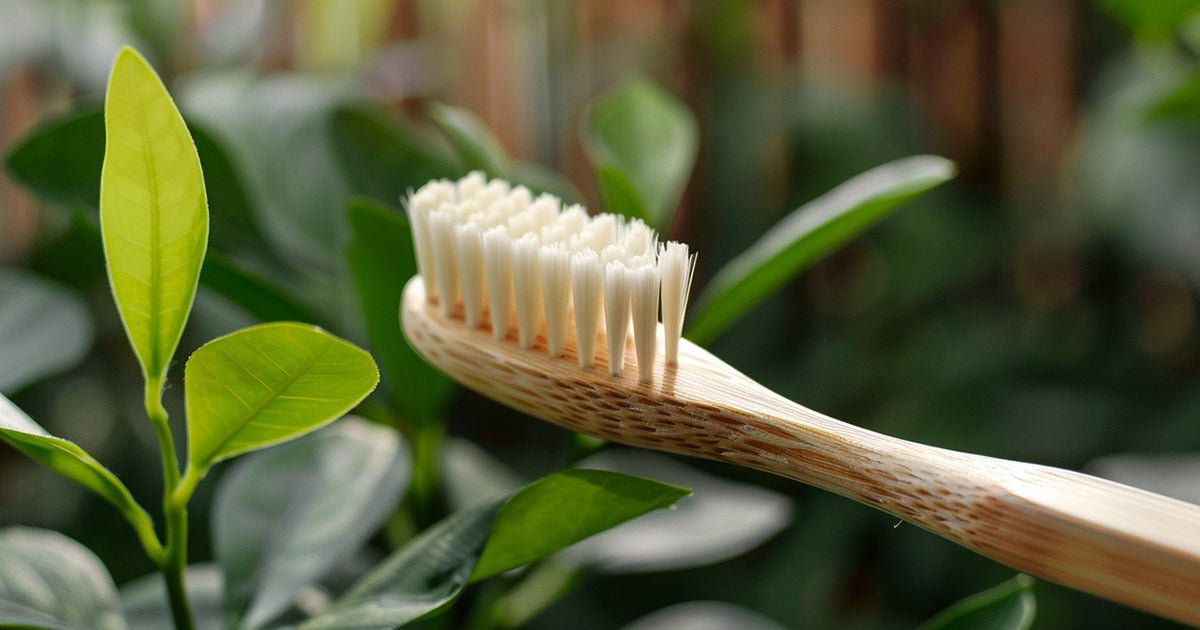In an era where environmental consciousness is paramount, the call for sustainability resonates across various aspects of our lives, extending even to our dental care. As discerning consumers increasingly seek alternatives to traditional toothbrushes, it becomes crucial to unravel the complexities of sustainable toothbrush design, understanding the materials that contribute to crafting a greener smile.
The Bamboo Revolution: Handle with Care
At the forefront of sustainable toothbrush design stands the humble bamboo handle, emblematic of a more environmentally considerate approach. Known for its rapid growth and renewability, bamboo emerges as an eco-friendly alternative to traditional plastic handles. Embracing the principles of reduce, reuse, and recycle, bamboo contributes to a reduction in the environmental impact associated with toothbrush production.
Check-out the following Sustainable tomorrow products :
Bristles with a Conscience: From Plant-Based to Biodegradable
The heart of effective tooth cleaning lies in the bristles, and within the realm of sustainable toothbrushes, these bristles have undergone a green revolution. Many sustainable toothbrushes now feature plant-based bristles derived from materials like castor oil such as the Bamboo Electric Toothbrush for Kids or cornstarch, offering an eco-friendly alternative to traditional nylon options. For those seeking a wholly biodegradable solution, some toothbrushes present pig hair bristles as a natural and compostable choice.
The Resurgence of Recycled Plastic
While traditional plastic toothbrushes contribute significantly to environmental pollution, some sustainable alternatives incorporate recycled plastic into their design. By repurposing post-consumer or post-industrial plastic, these toothbrushes help divert plastic waste from landfills and simultaneously reduce the demand for new plastic production.
Cornstarch Packaging: Closing the Loop on Sustainability
Beyond the toothbrush itself, sustainable packaging plays a vital role in minimizing environmental impact. Cornstarch-based packaging has emerged as a compostable alternative to traditional plastic packaging. This innovative approach ensures that every aspect of the toothbrush, from handle to packaging, aligns with eco-friendly principles.
Charcoal-Infused Bristles: A Natural Touch to Oral Care or Potential Pitfall?
For those desiring a touch of nature in their oral care routine, charcoal-infused bristles provide a sustainable option. Charcoal, known for its natural cleansing properties, not only adds an eco-friendly twist to toothbrush design but also harnesses the power of nature for effective dental hygiene.
While charcoal has gained popularity for its purported ability to absorb impurities, its abrasiveness raises concerns among dental professionals. The gritty nature of charcoal particles may contribute to enamel erosion and gum irritation over time, potentially outweighing the benefits of its natural cleansing properties. Moreover, the lack of standardized guidelines for the particle size in these bristles adds an element of uncertainty to their safety. Please read this article to learn more about activated charcoal bristles.
Additionally, the disposal of toothbrushes with charcoal-infused bristles may pose challenges, as the charcoal may not break down easily in certain waste management systems.
The Rise of Recyclable Nylon
Recognizing the challenges posed by traditional nylon bristles, some sustainable toothbrushes feature recyclable nylon options. While not entirely biodegradable, these bristles can be separated from the handle for recycling, contributing to a more circular and sustainable dental care model.
Silicone: A Durable and Versatile Alternative
Silicone, a material known for its versatility and durability, has found its way into the realm of sustainable toothbrush design. Some eco-friendly toothbrushes leverage silicone bristles, offering a longer lifespan compared to traditional options. This durability aligns with the principles of sustainable living by reducing the frequency of replacements.
Wood-Polymer Hybrids: Merging Tradition with Innovation
In a quest to merge tradition with innovation, wood-polymer hybrids have entered the sustainable toothbrush arena. These hybrids combine the strength and durability of polymers with the natural appeal of wood, providing a unique and eco-conscious option for consumers.
Zero-Waste Toothbrush Models: A Holistic Approach to Sustainability
Embracing a zero-waste lifestyle goes beyond individual components; it's about adopting a holistic approach. Some sustainable toothbrush models are designed with a commitment to minimizing waste at every stage, from production to disposal. These models often feature easily replaceable parts, extending the toothbrush's lifespan and reducing overall environmental impact.
The Importance of Certification
Navigating the landscape of sustainable toothbrushes is made easier by looking for relevant certifications. Recognized eco-labels, such as the Forest Stewardship Council (FSC) for bamboo sourcing or certifications from organizations promoting sustainable practices, offer assurance that the toothbrush meets stringent environmental standards.
DIY Toothbrush Options: Empowering Sustainability
For the environmentally conscious DIY enthusiast, crafting a toothbrush at home is a viable option. DIY toothbrushes can be made from a variety of sustainable materials, allowing individuals to tailor the design to their preferences and reduce reliance on commercial products.
Beyond Brushing: Embracing Sustainability in Oral Care Accessories
Sustainability in oral care extends beyond the toothbrush itself. Eco-friendly dental care encompasses accessories like floss, tongue cleaners, and mouthwash. Exploring sustainable alternatives for these accessories ensures a comprehensive and environmentally friendly oral hygiene routine.
The Environmental Impact of Traditional Toothbrushes
Understanding the environmental impact of conventional toothbrushes is integral to appreciating the significance of sustainable alternatives. From the depletion of non-renewable resources in production to the challenges of plastic disposal, traditional toothbrushes contribute significantly to ecological issues.
Consumer Awareness and Responsible Choices
As consumers increasingly prioritize sustainability, their choices shape the market. Heightened awareness of the environmental impact of everyday items, including toothbrushes, empowers individuals to make responsible and eco-conscious choices, fostering a more sustainable future.
Conclusion: A Brighter, Greener Dental Future
In the quest for a brighter, greener dental future, sustainable toothbrush components play a pivotal role. From bamboo handles to plant-based bristles, the choices we make in oral care resonate with broader environmental goals. By understanding the intricacies of sustainable toothbrush design, we empower ourselves to make conscious choices that contribute to a healthier planet—one brushstroke at a time. As we embrace these eco-friendly alternatives, we not only care for our smiles but also contribute to the well-being of the planet we call home.


Share:
Sip or Gulp: The Impact of Beverages on Your Dental Health
Sustainable Toothbrush Materials: Navigating Green Choices for Your Oral Care